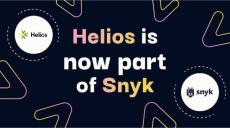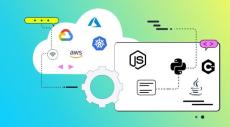|
By Eli Cohen
It’s been quite an amazing, bumpy, yet satisfying journey – and we’re delighted to join Snyk, the market leader in developer security. As part of Snyk, we’ll be able to deliver our product, technology, and vision into the hands of thousands of customers and millions of users.
|
By Helios
Application security testing tools are designed to ensure that applications are put through rigorous security assessments to identify security flaws within the application and its code. Even though applications are tested thoroughly (in static and dynamic ways), attackers always seem to find new ways of compromising them.
|
By Ran Nozik
Collecting data in real-time plays a crucial role in securing, monitoring, and troubleshooting applications. This real-time data, often referred to as ‘runtime data,’ provides unique insights into the application’s behavior, which aren’t available through other collection techniques. But the tricky part is that collecting runtime data comes with challenges.
|
By Eli Cohen
Modern development teams increasingly rely on open-source packages to rapidly build and deploy applications. In fact, most, if not all applications consist of far more open-source and 3rd-party code than the code that’s written by their dev teams.
|
By Eli Cohen
Observability and security are converging, benefiting dev and security teams. Runtime observability is the missing component to this important endeavor, providing much-needed data and insights to DevSecOps and AppSec teams.
|
By Helios
We are thrilled to announce that Helios, the applied observability platform for developers, is now available on the AWS Marketplace! This marks a significant milestone in providing visibility and runtime insights for easy troubleshooting and reduced MTTR. This further cements our commitment to providing top-tier services to our customers and to AWS users. By bringing Helios directly to the AWS Marketplace, it is easier than ever to access and onboard our platform.
|
By Helios
Scaling the deployment, in order to meet demand or extend capabilities, is a known challenge in many fields, but it’s particularly pertinent when scaling microservices. This article looks at the challenges of scaling microservices and examines best practices to overcome them while maintaining app quality, dev efficiency, and a good developer experience.
|
By Helios
eBPF, or Extended Berkeley Packet Filter, is a kernel technology available since Linux 4.4. It lets developers run programs without adding additional modules or modifying the kernel source code. Think of it as a lightweight, sandboxed virtual machine (VM) within the Linux kernel that lets you run Berkeley Packet Filter (BPF) bytecode that uses certain kernel resources. Utilizing eBPF removes the need to modify the kernel source code and improves the software’s capacity to use existing layers.
|
By Oren Levy
On-call shifts are part of every developer’s job – we’ve all been there. It’s 3am, suddenly you get an alert for an issue occurring in production. The microservices landscape is complicated and finding the root cause of an issue is like looking for a needle in a haystack. How can you get to the root of what’s happening in the system so you can analyze and resolve the issue quickly and effectively?
|
By Helios
When I first met Uria Franko, the CTO of Novacy, I immediately knew we’d hit it off. He was looking for an observability solution for his team with a specific need around Celery, after they had been using logs but found they lacked the depth and granularity they needed. Luckily, our mission at Helios is to help organizations gain visibility and drill down into services through traces. So this was a perfect match.
- January 2024 (1)
- November 2023 (3)
- September 2023 (2)
- August 2023 (4)
- July 2023 (4)
- June 2023 (4)
- May 2023 (4)
- April 2023 (4)
- March 2023 (3)
- February 2023 (2)
- January 2023 (2)
- December 2022 (4)
- November 2022 (7)
- October 2022 (3)
- September 2022 (2)
- August 2022 (2)
- July 2022 (2)
- June 2022 (5)
- May 2022 (2)
- April 2022 (3)
- March 2022 (3)
- February 2022 (3)
Investigate issues, reproduce scenarios, and generate tests for your cloud-native applications faster with actionable data across your microservices, messaging systems, data pipelines, and databases.
Helios is built on OpenTelemetry making distributed tracing data actionable for you, as early as your local environment. It integrates with your existing logging, error monitoring, and CI, so you can get a full picture of every issue and fix it fast.
Find and fix complex issues faster than ever:
- Get a full dynamic view of your system: Helios provides an integrated E2E view of your system across microservices, serverless functions, databases, and 3rd party APIs.
- Everything you need for cloud-native debugging: Helios gathers traces, payloads, logs, metrics, and errors to help you fix issues faster than ever.
- Generate E2E test code to validate complex backend behaviors in minutes: Take advantage of distributed tracing to easily validate previously tedious-to-test asynchronous operations in your system.
The fastest way to troubleshoot and test your distributed applications.











